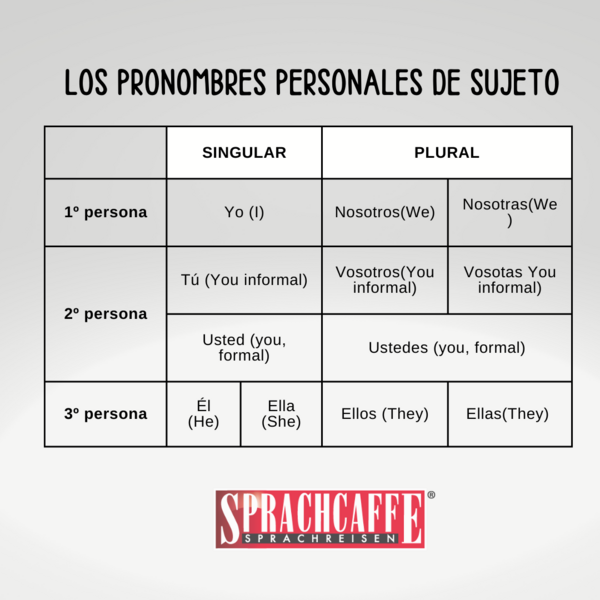Pronouns in Spanish
Pronouns are short words that provide clarity, precision and fluency to the language as they are used to replace or refer to nouns and other elements, thus avoiding unnecessary repetition. In Spanish we find different types of pronouns. On this page you will find the conjugation of pronouns: personal, possessive, direct and indirect object and indefinite. Enrich your Spanish and learn pronouns with Sprachcaffe!
Spanish language trip
Improve your Spanish and have a wonderful holiday!
Possessive pronouns
| Grammatical person | Singular possessed thing | Plural possessed thing |
|---|---|---|
| Yo | Mío/mía (mine) | Míos/mías |
| Tú | Tuyo/tuya (yours) | Tuyos/tuyas |
| Él/Ella/Usted | Suyo/suya (he, she, its, yours) | Suyos/suyas |
| Nosotros/nosotras | Nuestro/nuestra (ours) | Nuestros/nuestras |
| Vosotros/Vosotras | Vuestro/vuestra (yours) | Vuestros/vuestras |
| Ellos/ellas/ustedes | Suyo/suya (theirs, yours) | Suyos/suyas |
Possessive pronouns in Spanish indicate to whom something belongs. These pronouns agree in gender and number with the object or person possessed and also vary according to the grammatical person (first, second or third).
The direct and indirect object pronouns
Direct and indirect object pronouns in Spanish are pronouns that replace direct and indirect objects in a sentence to avoid repetition of nouns and improve the fluency of speech.
- Direct object pronouns: are used to replace an object that receives the action directly. These pronouns avoid repetition of the noun and provide conciseness and fluency to the language.
- Indirect object pronouns are used to refer to the addressee or receiver of the action in a sentence. These pronouns replace the prepositional complement "a" followed by a noun or pronoun, and help to avoid repetition and improve fluency in communication.
These pronouns must also agree in gender and number with the object or person they refer to.
| Personal pronouns - Direct object - Indirect object | ||
|---|---|---|
| Yo | me (me) | me (for me) |
| Tú | te (you) | Te (for you) |
| Él/Ella/Usted | Lo/la (him, her, you) | le (for him, her, it) |
| Nosotros/nosotras | nos (us) | nos (for us) |
| Vosotros/Vosotras | os (you) | os (for you guys) |
| Ellos/ellas/ustedes | los/las (them and you) | les (for them, you guys) |
Improve your Spanish grammar with a language trip
Want to improve your Spanish? Start your unforgettable language trip to the Spanish-speaking country of your choice now!
Indefinite pronouns
Indefinite pronouns refer to people or things in a non-specific way. These pronouns express a vague idea about the referent, without specifying who, what or how many they are.
| Pronombre | Explicación y ejemplo |
|---|---|
| Alguien / Alguno / Alguna | Indican una persona de manera no específica. Ejemplo: Alguien llamó por teléfono (someone phoned) |
| Nadie/ Ninguno / Ninguna | Indican ninguna persona o cosa. Ejemplo: Nadie sabe la respuesta (no one knows the answer) |
| Algo | Indica una cosa de manera no específica. Ejemplo: Tengo que comprar algo en la tienda (I have to buy something at the store). |
| Nada | Indica ninguna cosa o ninguna cantidad. Ejemplo: No tengo nada que hacer (I have nothing to do). |
| Cualquier/ Cualquiera | Indican cualquier persona, cosa o lugar. Ejemplo: Puedes elegir cualquier plato del menú (you can choose any dish from the menu). |
| Todo/ todos/ toda/ todas | Indican la totalidad, sin excluir nada o nadie. Ejemplo: Todos quieren ir al cine (everybody wants to go to the movies). |
| Mucho/ mucha / muchas / muchos | Indican cantidad en general. Ejemplo: Tengo mucho trabajo (I have a lot of work to do). |
| Poco / Pocos / Poca / Pocas | Indican escasa cantidad. Ejemplo: Tengo poco dinero (I have little money). |
| Otro / Otros / Otra / Otras | Indican algo diferente o adicional. Ejemplo: Dame otro trozo de pastel (give me aother piece of cake). |
Conclusion
Mastering Spanish pronouns is essential for effective and accurate communication in Spanish. Despite the difficulties that may arise during learning, it is essential to approach them with patience and dedication. To improve in the use of pronouns, it is recommended to practice with specific exercises, read Spanish texts to become familiar with their application in context, and seek the assistance of a teacher or tutor who can provide guidance and clarify doubts. At Sprachcaffe we will be happy to help you.




